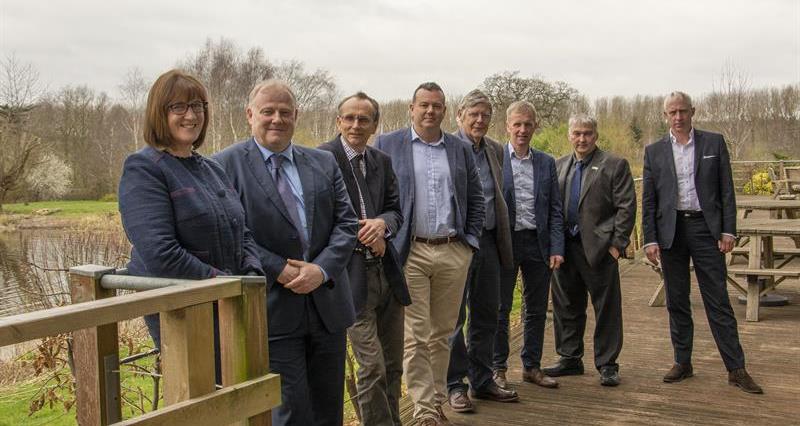It aims to create benefits for all farm businesses as well as the environment by working with members, other NFU commodity boards, government, government agencies and other stakeholders to ensure farmers’ views on the environment are at the forefront of policy making.
Meet the members of the group on this page and read the latest minutes and agendas.
Meet the newest member of the Environment forum, James Smith
Read about the 2019-2021 priorities for the NFU Environment Forum
Looking for NFU Environment Forum minutes? Visit our NFU minutes library
Meet the Environment Forum members:
Richard Bramley – Environment Forum chairman and North East representative
Richard Bramley is an arable farmer from near York, farming 500 acres of combinable and root crops.
In 2013, Richard was the winner of the RSPB Nature of Farming Award (Northern). He invests in his own professional development and is a member of Institute of Agricultural Management and a Chartered Environmentalist (CEnv). Richard is also actively involved with university research and education.
Alongside his arable operations, Richard is involved in a diverse range of environmental work on his farm, virtually all of which he has provided on a voluntary basis.
All watercourses are protected with 7 m diverse margins, which include approximately 3 ha with flowering plants. In addition, he has 1 ha of land dedicated to providing overwintering bird food and 1 ha of pollen and nectar mix to provide food for bees, butterflies and other insects.

He has approximately 8 ha of grassland, which is mainly riverbanks and field corners, with no nutrient inputs, providing encouraging a diversity of plant species.
Roughly 12,000 of mixed hedgerow species types have been planted on Richard’s farm and 2,000 mixed trees.
A number of bird and bat boxes have been put in place around the farm, and in the past he has installed vole pontoons, kingfisher fishing stakes and a grass snake nest.
Since 2007, Richard has used ‘cover cropping’ on the farm, which is temporary crop and is used to preserve nutrients and protect soils at key times in the farming calendar, now covering over 50ha on one 200 ha farm.
In addition, Richard grows between 7 and 8 different crop types which adds to the diversity on his farm.
Solar power generated on the farm provides 100% of electricity for Richard’s farmhouse, office and three holiday barns. All heating is provided by biomass generated on the farm.
Public engagement and engagement is important to Richard and he hosts visits for fellow farmers and other organisations with an interest in the countryside.
Richard said: “As land managers, farmers are central to making it possible to deliver good safe quality food and a practical level of biodiversity in a sustainable fashion.
“Yet the practicalities of being able to deliver this demand, in a very populated country and a hunger for cheap food, are far too often ignored.
“For British agriculture to face the challenges of the future, we need to do more to strengthen relationships and build confidence in the supply chain.
Phil Jarvis – East Midlands
Phil Jarvis is the farm manager at the Allerton Project farm at Loddington in Leicestershire. The farm is 333 hectares growing winter wheat, winter oilseed rape, winter/spring oats and winter/spring beans. Sheep graze 30 hectares of permanent grassland. The farm has 20 hectares of woodland and numerous stream and ponds within its boundaries.
Soil management is important to farming operations at Loddington and Phil’s aim is to make the soils more resilient. Practices adopted on the farm include widening rotations, introducing cover crops, and making the transition towards direct drilling, which allows soils to remain undisturbed by leaving crop residues on the surface from harvest until sowing.
Water friendly farming measures have also being introduced. These include interceptor wetlands receiving water from surface runoff and field drains, streamside fencing and installation of alternative livestock drinking sites. There are many grass buffer strips already in place. Nutrient mapping and nutrient management planning have also been adopted.

Game management practised on the farm has been shown to have beneficial effects on other wildlife through habitat management, predator control and supplementary feeding in winter and the abundance of many bird species has increased in recent years. In addition, habitats have been created in the non-cropped areas to benefit a range of terrestrial wildlife.
All in all, some 10 % of the land at Loddington is out of production and in environmental enhancement to achieve benefits to water, pollinators, plants and other wildlife.
Phil said: “Landscape management is about a ‘balance’ and ‘ a partnership’, if we stray too far from this middle ground we end up with polarised viewpoints and numerous conflicts and discussion. All sides have to recognise the importance of the need to deliver economic and environmental benefits.”
Mark Pope – South West
Mark Pope is the NFU’s Environment Forum Chairman and farms 700 acres of arable land in the Blackdown AONB, Somerset.
Mark recognises that the environment is key to farming’s productive potential. On his farm there are 48 km of field margins, providing habitat and food for birds and insects, and all watercourses are protected with 6 m margins.
He also has 2 ha of wild bird seed cover, providing feed for the birds, and seen a large increase in yellow hammers as a result. The farm also has 2 ha of pollen and nectar mix to provide food for bees and butterflies.
Countless field corners are left uncultivated, providing habitat for wildlife and encouraging diverse plant species types, and over the last 15 years Mark has laid and gapped up over 1000 m of hedgerow.

Mark is in the process of converting or reverting an 8 ha arable field to grassland to help increase the variety of habitat the landscape. Now in the 5th year of conversion, Mark is starting to see real change, with more skylark nests and interesting wild flowers starting to appear.
All heating used the farm comes from a biomass boiler using miscanthus and straw, renewable materials from the farm.
Following the Somerset floods in 2013/2014, Mark and other farmers have participated in an initiative to put in place interventions to ‘slow the flow’ of water in the landscape. Mark has allowed coir rolls, which trap soil and water, to be placed in unproductive field corners.
Mark is also involved in hosting and arranging school visits to farms in the county and by the end of this year will have had over 2000 school children out on visits, showing how environment benefits can be integrated into and delivered on commercial farms.
He said: “My simple philosophy is that any intervention to help make environmental improvements on my farm must work alongside my primary aim to produce high quality food.
“Over the years, efficiency gains, better use of resources, participation in agri-environment schemes, my own voluntary activities through the Campaign for the Farmed Environment (CFE) and involvement in natural flood management schemes have resulted in a great deal of environmental benefit, alongside my commercial farming activities.
“The farm visits that we organise are invaluable at reconnecting children with farming, food and our vibrant environment. This can only be good for the farming sector and for the education of our children but also their health and wellbeing.”
Robert Brunt - North West
Robert Brunt and his family are dairy, beef and sheep farmers from Macclesfield, Cheshire in the Peak District National Park. The majority of the farmland is in an upland area.
In this traditional upland landscape, over the past 20 years, Robert’s family have repaired some traditional farm buildings and rebuilt over 1000 m of dry stone walling. More recently help from a boundary grant scheme has enabled this restoration work.
Hedgerow management over the past few years has seen around 400 m of hedge laying and restoration to provide habitats and food sources for wildlife.
Over 90% of the farm is classified as permanent pasture, with considerable areas of low nutrient input and zero input grassland, to encourage a diversity of plant species types, and corners of fields are left un-mowed to help encourage wildlife.

Good and efficient use of resources is also an important part of day-to-day consideration on Robert’s family farm. Significant investments have been made over the years, including in covering the slurry stores and a large open yard, which have helped reduce emissions such as methane and ammonia but also removed the need to build another slurry store.
Through making better use of the manure and slurry generated on the farm, Robert has halved the amount of artificial fertiliser used on the land to produce silage. It has also allowed Robert to increase the area of grazed land which receives no artificial fertiliser at all.
In addition, water in a plate cooler is used to pre-cool milk from parlour, so saving electricity. This same water is then reused for washing down the parlour or for drinking water for the cattle.
The heat recovered from a fridge is used to heat water used for washing and calf feeding, again saving Robert electricity.
The farm also produces 10% of its own electricity generated from solar power.
Robert said: “Farming has shaped our iconic upland landscapes and created one of the most important managed environments in the country. This landscape brings millions of people to the countryside every year, supporting local jobs in tourism and other local businesses.
“I believe I have an important role in helping manage and look after our beautiful landscape and countryside.
“Over the years, we have invested to improve productivity on the farm but also invested to increase efficiency in our use of nutrients, such as nitrogen. In a bid to do this, we have recently purchased equipment such as a trailing shoe spreader with the help of a grant scheme. This has reduced our environmental impact and footprint.”
Robert Lockhart – West Midlands
Robert farms at Drayton Bassett, near Tamworth, Staffordshire. He currently farms 110 hectares, growing cereals including milling wheat, oil seed rape and malting barley and he takes on additional land to grow potatoes.
Robert’s farm has been managed under an agri-environment scheme agreement for some 14 years, with a number of environmental features including the field margins and an area of recreated wetland.
Most of the farm is either managed under an Entry Level Stewardship (ELS) scheme, or a Higher Level Stewardship (HLS) scheme, with the exception of one field which is on the designated route for the HS2 line.
The line has not been constructed yet, but 3 ha of land have been taken into temporary possession for environmental mitigation. HS2 have completed various environmental work on the area and Robert is to be compensated for crop loss.

Environmental actions under the Campaign for the Farmed Environment (CFE) are also practised on Robert's farm, such as leaving areas of land uncultivated next to the ponds and field corners, to provide habitat for wildlife.
With a watercourse next to every field on the farm, Robert has 6-8 m field margins acting as buffers, and the farm has 6 natural ponds and 2 partially dry marl pits, providing habitat for wildlife.
Robert has invested in restoring hedging around the farm and undertaken some tree planting.
An area of the farm that was once a temporary radar station and accommodation huts during the Second World War is now an open space of 70 acres, attracting lapwings and skylarks.
Nectar and pollen mixes and wild flower mixes on the farm provide food for birds, bees, butterflies and other insects.
Some 15 years ago, Robert installed a 38,000 cubic meter reservoir. This has just under 2 ha of open water, attracting birds and other wildlife and is winter filled, when water is most available.
“My ambition to increase growth in agricultural production, alongside protecting and enhancing the environment does not mean that should be at a cost to the environment”, said Robert.
“I recognise that protecting the natural environment is important to my productive potential.”
For the past 30 years Jake has worked in Land Management, previously employed by the Raveningham Estate in South Norfolk as Estate Manager.
Jake has since taken on the role of Director of Conservation at the Holkham Estate, 25,000 acres in North Norfolk, which boasts visitor numbers in excess of one million annually and an extensive farming operation.
Jake oversees the 10,000 acre National Nature Reserve which includes 2000 acres of fresh water grazing marsh which over the years has become a haven for wildlife and in particular ground-nesting and over-wintering wild fowl and waders. The estate was designated as a National Nature Reserve in 1967 and was managed by Natural England until 2012. The Holkham Estate was awarded Approved Body Status under Section 35 of the Wildlife and Countryside Act, which enables the estate to actively manage the Holkham National Nature Reserve. These areas are included in several designations including SSSI, RAMSAR and North Norfolk Coast ANOB.
The Holkham in-house farming operation has a continued policy of maintaining a diverse range of habitats with 8 Agri-environment schemes running simultaneously and delivering a range of environmental benefits across the farming operation. Food production is at the heart of the commercial activity on the estate with 3500ha being utilised for a variety of combinable crops including Winter Barley, Wheat and Rye along with Oil Seed Rape and Maize with a small percentage of root crops such as Potatoes and Sugar Beet.
The Holkham Estate runs an 800 head strong continental suckler herd which includes 60 Belted Galloways well suited to a range of environments and conditions. In conjunction with the cattle a flock of 1800 sheep are managed by the estate which graze on catch and cover crops over winter along with calcareous grassland which is floristically enhanced, providing a year-round food source for birds and mammals whilst also encouraging a wide range of pollinators, along with breeding cover for a range of Biodiversity Action Plan Species.
ar round food source for birds and mammals whilst also encouraging a wide range of pollinators. Some 80 acres provide enhanced wild bird cover offering winter food and spring brood rearing cover for a range of Biodiversity Action Plan species. In addition, the Estate has some 120 acres in wet grasslands for breeding waders and over-wintering wild fowl.

James Smith - South East
A leading grower from Kent will be representing the interests of farmers and growers from the South East on the NFU’s Environment Forum.
Apple and pear grower James Smith, managing director of Loddington Farm, Maidstone joins the forum which has responsibility for steering and shaping the NFU’s environment policy. The forum covers policy areas including, but not exclusively, air quality, access and rights of way, agri-environment, biodiversity, climate change, water quality, waste, soil, flooding and water resources.
Mr Smith, a Nuffield scholar and a former chairman of Kent NFU, has embraced regenerative agriculture practices on his farm.

He said: “I am delighted to be joining the NFU’s Environment Forum at such a critical time of change for our industry when we are all working towards an ambition to be net zero by 2040. I am passionate about farming with nature to produce nutrient-dense food for a healthier world, and I think the pandemic has helped consumers to recognise the importance of home-grown food. Working with the NFU, I will be helping to fight the corner for food producers. Not only is a new domestic agricultural policy being shaped, but one of the biggest pieces of legislation for a quarter of a century, the Environment Bill, is going through Parliament. I hope we can ensure decision-makers understand the critical role farmers and growers play in delivering a secure supply of food while tackling climate change.”
Mr Smith is transitioning towards chemical-free farming since 2020 and is focussing on soil health as the foundation of his farming system. Former orchard land is given a break with the planting of cover crops that are then grazed sheep to boost organic matter and improve soil health. In addition, new orchards are planted with diverse swards to increase biodiversity. Loddington Farm is diversifying with new crops such as apricots, cherries, aronia berries and juniper, as well as livestock. Last year the business acquired Owlet Fruit Juice to add value to more of its crops.
Mr Smith added: “Everything at Loddington Farm is about embracing nature and farming with biology rather than chemistry. It’s an exciting time to be farming and joining the forum is a great way to influence positive changes for UK farming.
Hedd Pugh – Wales
Hedd Pugh is Chair of the NFU Cymru Rural Affairs Board and member of the NFU Environment Forum. He farms 800 ha with his two sons - this includes approximately 610 ha of mountains in the Snowdonia National Park including Aran Fawddwy which rises above 2900 ft.
Hedd runs a flock of 1600 ewes which are predominantly Welsh Mountain together with a herd of 40 suckler cows. Hedd has participated in agri-environment schemes for 25 years and during that time has planted over 2000 trees of native species; completed over 7,000 m of hedgerow restoration; established 1900m of streamside corridors; 250 m restoration of dry-stone walls; 15 ha stock excluded woodland; with 560 ha enclosed mountain under active management for habitat improvement.
He is a keen participant in agri-environment schemes and said: “We farm in a stunning location. The Welsh landscape that we see and enjoy today – and which supports a diverse range of habitats and species – has been created, shaped and is maintained by farming activity over hundreds of years.
It is very much a managed landscape and we recognise as farmers the wide range of public goods we provide, this not only includes high quality food but also wider benefits for biodiversity, carbon storage, clean water and energy generation.

